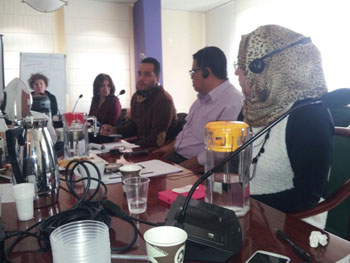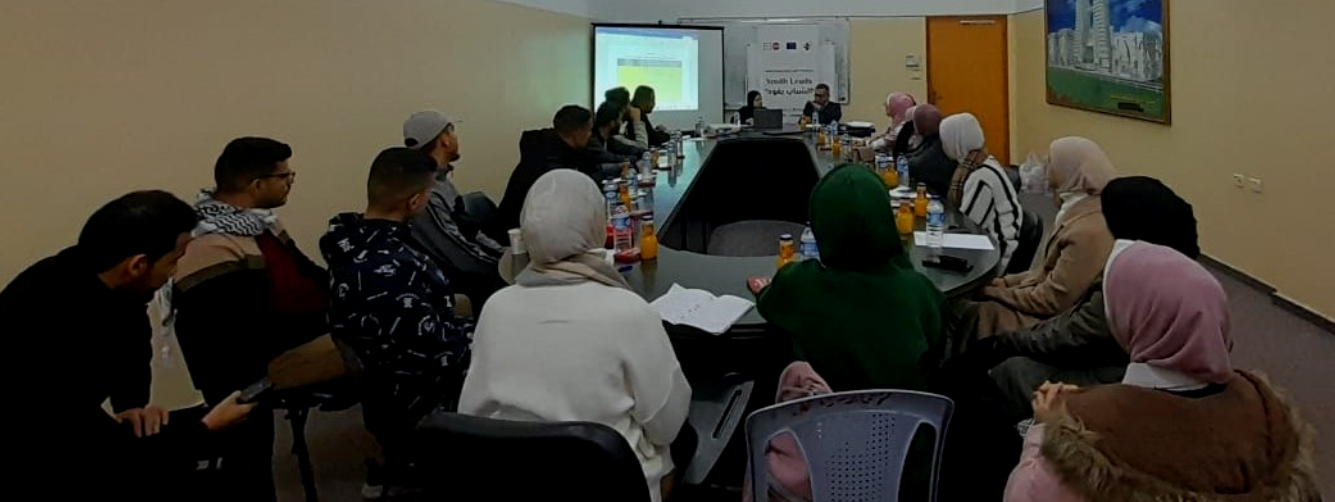
Ramallah -- As part of its project, “Institutionalizing UN Resolution 1325 to achieve peace and security for Palestinian women”, in partnership with Oxfam Novib, MIFTAH capped off a series of seminars on national and international lobbying and advocacy mechanisms and tools including international laws and UN Resolutions pertaining to promoting peace and security for women.
The first meetings held late November 2014, were facilitated by Dr. Vanessa Farr from South Africa and attended by MIFTAH’s team and media representatives. Presentations explored the history of the global women’s movement since the 1950s and until the ratification of the Convention on the Elimination all Forms of Discrimination against Women (CEDAW), linking it with (GR30), UN Security Council Resolutions 1325 (2000), 2122 (2013) which recommits to the consultation of women in peace talks, and the Arms Trade Treaty (ATT) (2013) especially Article (7.4) stating if those arms will be used to harm women and children, arms transfer must be stopped. Discussions highlighted the relevance of these documents to the Palestinian struggle.
The meetings focused on advocacy mechanisms through social networking and the importance of voicing unified messages in order to garner solidarity with the Palestinian people, especially women. This is achieved through shedding the light on human rights violations against Palestinian women and girls by the Israeli occupation and ensuring that the Palestinian narrative is credibly disseminated. It is also important that international public opinion is addressed on the basis of international agreements and resolutions.
Another seminar was organized for Secretariat members of the National Coalition for Implementing UNSCR 1325 in Palestine, and representatives from the General Union of Palestinian Women (GUPW) district branches.
Two experts, Lamia Shalaldih and Fatina Wathaefi, actively participated in the meetings. Both have worked on formulating a strategic plan for the National Coalition to put international resolutions and treaties related to peace and security for Palestinian women into action. A lobbying and advocacy plan resulting from the seminars will be included in this strategy, which the coalition, representing a number of women, media and human rights leading organizations, will implement over a three-year period. The plan will be drawn up through discussions with the members of the Secretariat.
Fatina Wathaefi: planning and gender expert
Wathaefi pointed to the importance of the interactive workshop saying: “It gives us information and ideas on how to support our efforts in addressing the international community towards protecting women and holding Israel, the occupying power, accountable for its crimes and oppression against women in particular.” She explained that the workshop focused on international treaties and resolutions on women, peace and security such as CEDAW, 1325, 2122, and the ATT. She pointed out the overlapping components between these resolutions and treaties and how to use them towards promoting protection for women and holding violators of Human Rights Laws and International Humanitarian (IHL) Laws accountable. This includes becoming familiarized with the tools that could be used to achieve this goal.
In this regard, Wathaefi said: "the importance of the seminars lies in how much one can benefit from these tools including the use of social networking such as Twitter and Facebook to connect with institutions, liberation movements and global women’s solidarity groups, therefore gaining their support and solidarity". She said the groups worked together in a series of workshops and came up with lobbying and advocacy directions to be put into action at the international level, ultimately to mobilize support for an international demand to end the occupation, all forms of violence against women and to secure women's protection.
Khitam Saafeen: General Union of Palestinian Women
Khitam Saafeen, member of the general board of the GUPW and President of the Union of Palestinian Women’s Committees, said: "the goal of the workshops was to focus on formulating a plan for the National Coalition to lobby and advocate in support of the Palestinian cause for freedom and Palestinian women, peace and security agenda, especially given the escalated violations by the Israeli occupation". She said participants reached consensus to unify the efforts of Palestinian women towards implementing an agenda for peace and security including protection of women, ensuring their participation in peace-making and holding rights violators accountable for their violations. “We need to revive our capabilities in the field of social media and impact,” she said. While she acknowledges there are local initiatives to this effect, there is still a need for enhancing the tools and methods used so they leave a bigger impact through advocacy and lobbying campaigns. She concluded that the first draft of the national coalition’s plan will be completed after the seminars with the participation of women’s legal and media organizations that advocate for women's rights and justice.
Lamia Shalaldeh: Women’s Center for Legal and Social Counseling (WCLAC)
Shalaldeh feels the strength of the seminars lies in its unification of advocacy mechanisms between women’s rights institutions. It also contributed to the formulation of a workplan for regional and international advocacy in order to provide protection for Palestinian women and to hold their violators accountable, namely Israel, the occupying power.
Shalaldeh pointed out that 14 years have gone by since the passing of UNSC Resolution 1325, saying it has been through ebbs and flows over the years. In the last year and a half however, it has been brought back to the fore of discussions in terms of how it can be invested, especially after the Israeli aggression on Gaza, escalating violence in Jerusalem and Hebron and the continued settlement encroachment in east Jerusalem and the rest of the Palestinian areas. Still, she says, “The resolution is only a means, a mechanism. Our point of strength is consensus between the institutions on how to use these international mechanisms.”
Shalaldeh pointed out the importance of working at the strategic level in terms of activating Resolution 1325 in terms of linking the violations against women with the military aspect, which in this case are Israel’s occupation soldiers. “Today there is the ATT, which we can be used against countries that supply Israel with arms. We can use these treaties to hold these countries accountable for the harm and impact of using illegal weapons furnished to the Israeli occupation and used against Palestinians at the hands of Israeli army.”







